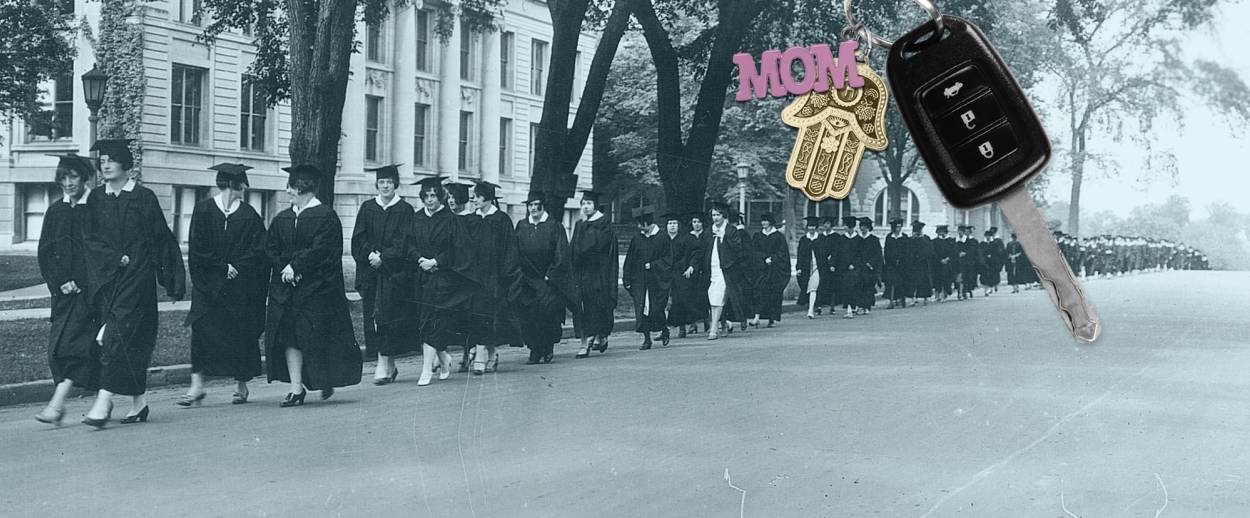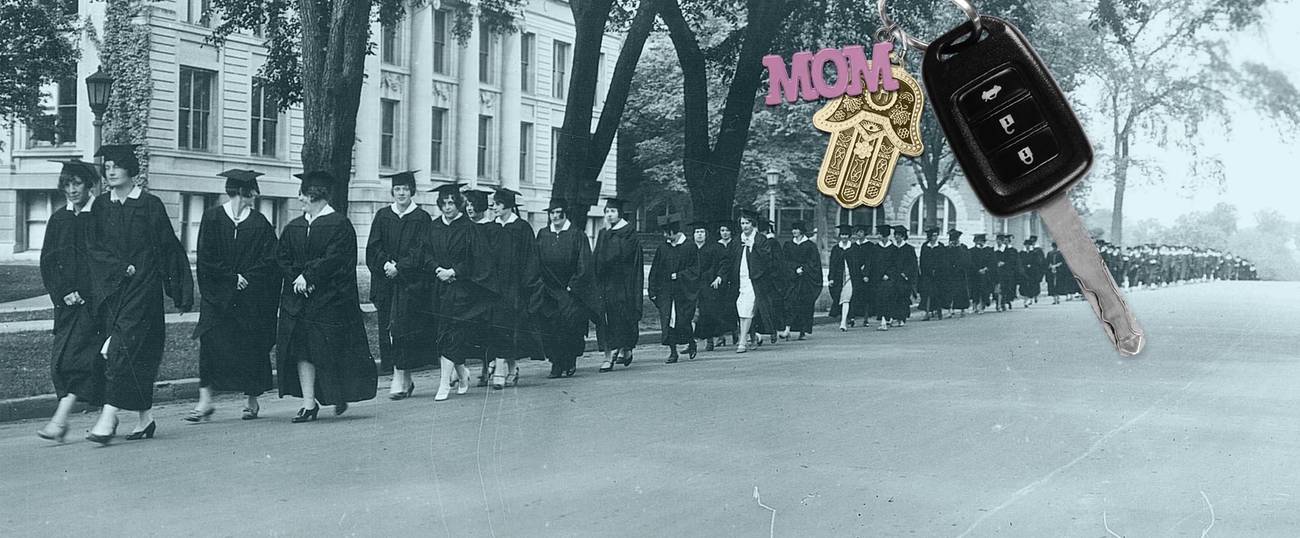Visiting Colleges, Filled With Ambivalence
A Midwest road trip makes a mother ponder independence, parenting, and Jewishness




Periodically I hear from a lovely reader who has been following my writing since I was the “East Village Mamele” at The Forward, back when my oldest daughter was an infant. If you are one of those people, let me BLOW YOUR MIND: Josie is heading off to college next year. Please sit down and breathe into a paper bag, which is what I am doing.
This summer my family drove across the country, visiting colleges throughout my husband’s Midwestern homeland. We had a lot of frozen custard (Kopp’s FTW) and saw cows and picturesque abandoned farmhouses. I am afraid of driving, but I got behind the wheel on the highway… and promptly hit a sparrow, which spattered on the windshield, and I hoped this was not a metaphor.
We attended info sessions and went on tours and ate in dining halls, and I focused with all my being on keeping my mouth shut. This is a challenge for me.
I wrote a book about good Jewish mama parenting practices, which often involve knowing when to keep one’s mouth shut and knowing when not to. A good question to ask oneself in pretty much any challenging situation is: “Is this the hill I want to die on?” Are you sure that you as a parent want to go mano a mano and issue demands and insist on your own correctness on a given topic? For me, a kid wanting to dye their hair fuchsia is not a hill to die on. Quitting music lessons after three years is not a hill to die on. Insisting that your kid call home if they’re going to be out after 10 p.m.? Unloading the dishwasher if I say, “Please unload the dishwasher”? Hills I will die on.
Naturally, I have strong feelings about colleges. I also know that with this particular kid (my other kid is another story—every kid is their own story), it’s best to let her take the lead in figuring out what kind of educational experience she wants. I realized I was on shaky ground when we visited our first school together, a small but high-powered bucolic institution in the Northeast. “It’s tiny! And it’s nowhere! And everyone is so sporty!” I blurted. She gave me the teen side-eye. “I don’t think it’s too small, and it’s gorgeous, and I am the captain of the volleyball team!” I idly observed that I probably should have gone to a women’s college, since unlike her I was afraid to speak up in classrooms full of pontificating dudes, so how wonderful that she was more assertive and didn’t need the sanctuary of a women’s college … and she stared at me dumbfounded. (Flash forward: She is planning on applying to several women’s colleges.) How I see her and how she sees herself do not always dovetail.
I swore to myself that I’d make neutral noises from there on in the college visiting process. One can express opinions without expressing opinions. My patron saint in this kind of strategizing is Judy Blume, who once said, “Moms come up to me at book signings and describe how they’re telling their daughters, ‘These were my favorite books!’ I say, ‘Quit it! That’s the biggest turnoff!’ You want to get them to read them, leave them around the house and every so often, say, ‘You’re not ready to read this yet.’”
If you actually think a child is not ready for something, the worst thing you can do is tell them. (Sinister cigarette marketers have known this for years, which is why they keep insisting in ads aimed at children that smoking is for grown-ups.) And do any of us think our kids are old enough to make huge decisions … like where to go to college?
Of course my nonlizard brain thinks Josie’s ready. I see her willingness to stand up to injustice; I admire the depth and complexity of her thinking; I marvel at the fluidity of her writing. And then the lizard brain takes over, and I blink and see her as the pumpkin-headed near-bald toddler who’d scream when she got frozen yogurt on her finger, toss away her frozen yogurt cup in a fury, then rage that she no longer had any frozen yogurt.
It doesn’t help that this is a first for us: She’s never before gotten to weigh in about where she’d go to school. When she was ready for pre-K, I obsessed about whether I wanted her to go to Jewish day school (as I did, until eighth grade) or public school (as I did for high school). We visited a lovely, haimish, nondenominational feminist day school in Brooklyn three times before we ultimately decided on public school—not just because of cost, but also because we wanted to support the fundamental values of public education. I felt bereft about giving up the immersion in Jewish texts and identity that I was blessed with, but I also felt grateful that my children would participate in a public institution that would expose them to the difference and diversity I didn’t truly experience as a child.
I have also joked that I’m the only Jewish mother in America to turn down a place in a gifted program. Even at 3, my child was so fierce and so competitive and so tough on herself, I worried about labeling her “gifted” and turning her into a grade-grubbing, test-obsessed little ball of anxiety. I might have made different choices if we hadn’t quite literally won the public-school lottery; Josie was lucky enough to be admitted to a lovely, diverse, community-minded, progressive, small public school in our neighborhood, where we sent her and where she thrived. We have been lucky.
I chose my kids’ Hebrew school. I chose their Jewish summer camp. (As you no doubt know, camp is a vital force in terms of both education and Jewish identity.) And again, we got lucky with middle school: Josie was admitted to another small, progressive public school, this one selecting its students via two writing samples (one done under the watchful eye of a teacher, since we now live in an era in which parents write their children’s admissions essays), teacher recommendations, interviews, and portfolios. And lucky for us again, it was a grade 6-12 school. We were blissfully free of the lunacy that is the high school admissions process in New York City.
And again, we are lucky—again, again, that word—to have options. Economics doesn’t have to dictate our family’s decision making when it comes to college. But suddenly I’m freaked out about something I never expected. Thinking about Josie choosing a school—and I fervently believe she has the right to make that choice—makes me drey about her Jewish identity all over again. On tours, guides mention the presence of Chabad on campus. But I don’t want her connection to Judaism to come through Chabad. I want her involved in an egalitarian, liberal community. Then I think about Hillel, the proffered alternative to Chabad, and I recall that during my own college years I thought Hillel was for dorks. I had a couple of Shabbat dinners there, but it wasn’t my scene. Should I be surprised if it’s not hers?
My connection to Judaism comes primarily through my interest in American immigration and labor history, Jewish prayer, art, songs, and stories, and most of all, the commitment to tikkun olam. I believe my daughter shares these interests. But I am frustrated that on campuses today, the very word “Jewish” is a litmus test on Israel. I am pretty far left on Israel (I believe in the country’s right to exist; I believe in a two-state solution; I believe the current Israeli government is a human-rights nightmare doing long-term damage to democracy, much like our own current government) but I wonder how many people who have my values Josie will actually be around in college. Her interests are in civil liberties and public policy. She was dismayed at her Jewish summer camp’s lack of discussion of moral ambiguity when it comes to Israel, and I couldn’t blame her. I have made mistakes in not exposing her to enough Jewish activism around Palestinian rights. I think I’ve done a good job on feminism, LGBT rights, and civil rights here in America, but I think my own ambivalence about Israel’s leadership has led to avoidance: my not saying and doing enough to convince her that the country, with all its profound flaws, is worth engaging with and working to improve. I worry that the politics she will engage in in college will include anti-Israel activism, which so often shades into anti-Semitism.
Will Josie, in college, find a community that sees Israel with the nuance I believe it’s due? Will they believe that there are two peoples with a legit claim on this little patch of land? Will she find friends who believe that Israel, like America, is worth fighting for?
But I try to listen to my own exhortations to keep my mouth shut. Hectoring her or dithering aloud about my own apprehensions is not helpful to either of us. All I can do is hope that she’ll choose well, find a community she loves, and continue to wrestle with her place in a broken world.
We’ve been lucky. I hope that luck holds.
***
Like this article? Sign up for our Daily Digest to get Tablet Magazine’s new content in your inbox each morning.
Marjorie Ingall is a former columnist for Tablet, the author of Mamaleh Knows Best, and a frequent contributor to the New York Times Book Review.